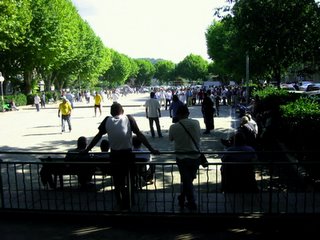
THIS IS THE COUNTER of The Cheese Course, the local cheese store, a block and a half off the plaza defining the center of the tourist destination that has become Healdsburg, California. I put it here as a decoy; I don’t think there’ll be much here today about cheese, though it’s on my mind as we tune our mentalities back to Holland, anticipating a week there at Christmastime.
What I’m thinking about now is the difference between Grazing and Eating. Each has its place. Last night, for example, we were at a wonderful party at Foreign Cinema, a favorite restaurant of ours in San Francisco, and since a couple of hundred people were jammed into the dining room, the courtyard, and the adjacent art gallery, refreshments were necessarily Small Plates: chiles relleños, little strips of grilled beefsteak, fried manchego (ah there, the cheese!), various tacos, prawns...
But Grazing is not Dining, and this came home to me a couple of weeks ago, in two consecutive dinners at really quite good restaurants in Portland. We ate first at Vindalho, a Goan-inspired restaurant striving to find a Portuguese presence in an Indian table, and I would never complain about the results, especially the date chutney, and the naan, and my lamb in yoghurt. (It’s amazing how a bit of lamb improves the innate sour curdled unpleasantness of yoghurt.)
But the six of us shared plates, a technique I famously (in my small circle) loathe, and the flavors piled up, shouldered one another aside, crowded forward, shouted all at once and in general behaved quite uncivilly. And the next night, and Nuestra Cocina, I refused to share in either direction, and tended to my duck-confit tamal with its raisins and mole, and lamb shank, of all things, cooked in rich tomato broth.
Now you might think duck confit and lamb shank add up to rather too rich a combination, and you would be right. But it was wintry that night, and Christmas is coming, and this goose is getting fat. In point of fact this was a beautifully balanced combination of courses, and I skipped dessert. (Though now that I look at the menu, and find two dessert tequilas on the list — one of them flavored with almond! — I have my regrets.)
HAVING GIVEN SOME THOUGHT to the hardly revolutionary idea of an orchestrated meal I decided to cook dinner the other night — not that my usual home-cooked dinners lack intelligence and artistry! And this is what we had:
cockaleeky soup
porkchops ma facon
steamed broccoli flowerets
green salad
And this is how I made it:
SOUP: Clean the leeks, lose much of the green part of the vegetable, and slice the remainder really thin. Sauté these slices in a little oil and salt. Peel as many potatoes as you’ve sliced leeks, cut them into smallish chunks, and dump them with the leeks into a pot of chicken stock. When the potatoes have cooked, smash them with a potato smasher, check for flavor, serve.
BROCCOLI: rinse the head, cut off flowerets, steam them in the water still clinging to them from the rinse, put in a shallow pan with a little salt and a pinch or two of red pepper flakes; steam under a lid until done.
CHOPS: Rub the white fat on the edges of two nice thick pork chops onto the surface of a black iron frying pan just big enough for them. Grind a tablespoon of fennel seeds, a teaspoon of black peppercorns, and a pinch of sea salt with a mortar and pestle. Drizzle a few drops of olive oil onto one side of each chop; then smear quite softly crushed garlic (see instruction for salad, below) onto it, and dust liberally with the fennelseed mixture. Put the chops, doctored side up, into the pan which you have let get quite hot, searing the untreated sides of the chops. Pry them up with a spatula and flip them, giving the now nicely browned sides the same treatment with oil, garlic, and dust. The chops will likely be done before you know it, after the second side is seared: press the surface with a forefinger to test. Remove the chops to the warmed dinner plates and deglaze the pan — this is where the inspiration came in — with dry Vermouth, reducing the result to a nice sauce.
SALAD: Our usual salad happens thus: I mash a clove of garlic in the garlic-press, then forcefully blend it , in the bowl we’ll use for salad, with a pinch or two of sea salt, using the tines of a dinner fork. I work this until the resulting paste is quite smooth and creamy, adding a teaspoonful of olive oil. When it’s all quite smooth I add the amount of oil we’ll need for the salad and let it stand through dinner, having washed and torn the lettuce (or, more likely, Lindsey having done the washing chore). After the main course (and, in this case, the soup, which naturally came first), I add enough vinegar — say one part to four of oil — and blend it briskly with the fork; then add the lettuces and toss.
THE POINT OF ALL THIS, of course, is the fascinating focus of the flavors. Chicken, leeks, potato. Broccoli, red pepper. Pork, fennel, garlic, vermouth. (I can’t overemphasize the beauty of that combination!) Salt, garlic, olive oil.
Years ago I knew a wonderful man named Anthony Boucher — well, he wasn’t named Anthony Boucher, but his name was so named, it was a nom de plume — an intellectual, a liberal, a humanist, a gourmet; a man who managed to combine several specialities in one rewarding though too brief life: a specialist in canon law, in liqueurs, in pornography; an author of mytery and science fiction; a historian of opera. The kind of man of whom it is said all to truly the sort no longer is in fashion.
In one of his stories, I wish I could remember which, he wrote about the first human travel to the planet Venus. As I recall the story was really about the technology involved, with perhaps a romantic plot carrying those details. But what I do recall, the only detail I recall, is a parenthetical aside in which his narrator refers to a plant discovered on the planet Venus, that plant without which, as is now well known, the combination of lamb, garlic, salt, and rosemary is utterly incomplete.
That’s a masterstroke of imagination, to think that combination needs yet another ingredient to render it perfect. Of course it does not: but then we can’t know. How could Tony have done this to us? How I wish I could introduce him to my vermouth, fennel, and pork!



